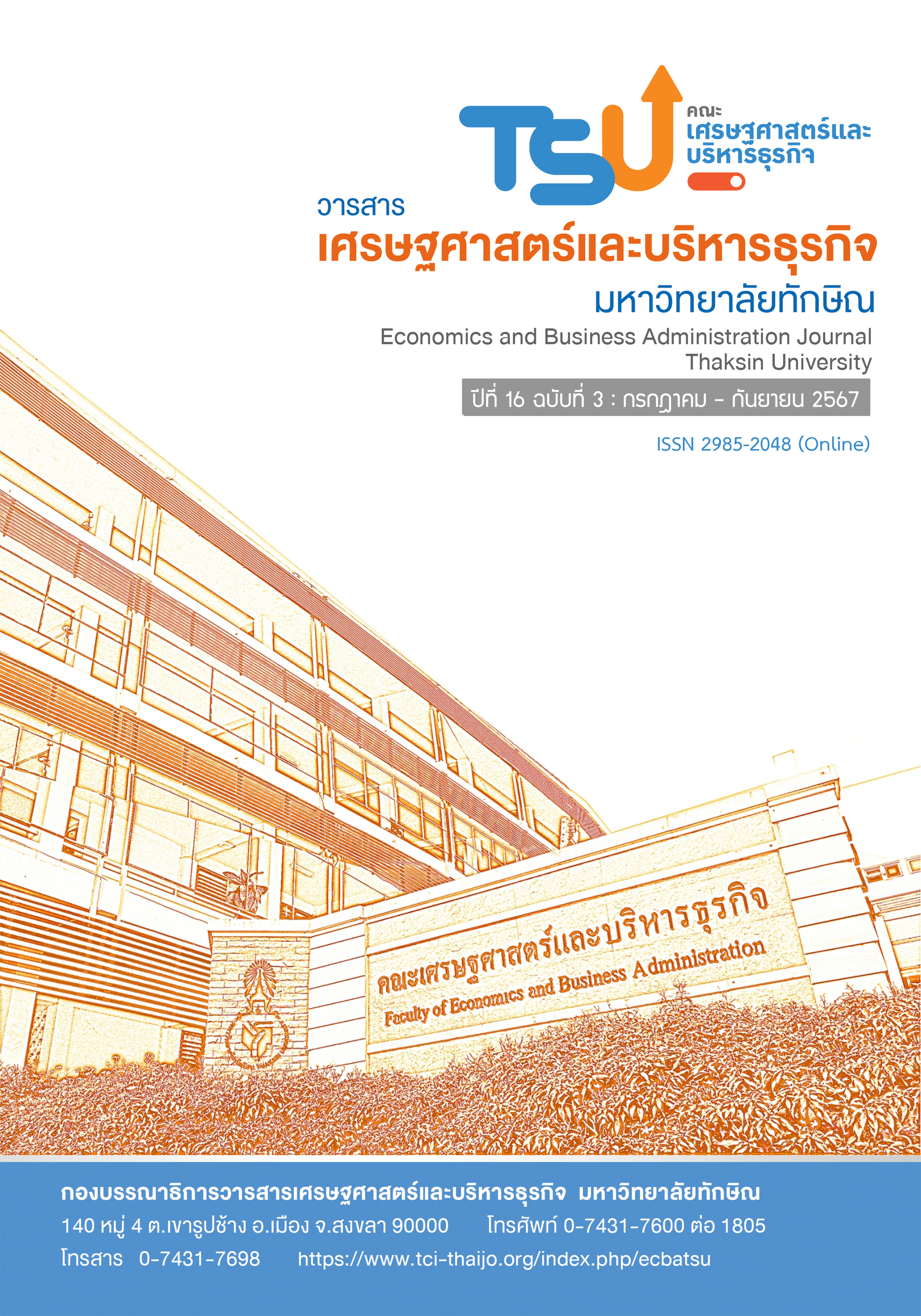The Development of a Business Model for Local Fishing Tourism and the Promotion of Consumption of Estuarine Fish, with the Involvement of the Communities in the Songkhla Lake Basin
DOI:
https://doi.org/10.55164/ecbajournal.v16i3.267236Keywords:
Tourism Business Model, Way of Life, Estuarine Fish, Songkhla Lake Lagoon Basin CommunitiesAbstract
The Songkhla Lake Basin is composed of three water systems: saline water, brackish water, and freshwater. This diversity in the aquatic environment results in a high level of biological diversity and important resources, particularly the estuarine fish, which possess unique characteristics in terms of taste and quality. The majority of the communities in the Songkhla Lake Basin rely on traditional fishing as their way of life. The objectives of this research were to analyze the targeted environmental conditions and to develop a model for the local fishing tourism industry and promote the consumption of the estuarine fish. This was done through a SWOT analysis and the development of a collaborative business model between researchers and the communities in the Songkhla Lake Basin, utilizing the Business Model Canvas framework. The study involved a sample group of 50 participants, including community leaders, stakeholders, and tourists. The research results provided a model for the development of local fishing tourism and the promotion of consumption of the estuarine fish, which can be applied appropriately to the context of the area. Additionally, policy recommendations have been proposed for development in six areas: attraction factors, tourism activities, management, information and communication, tourism facilities, and community organizations. These recommendations aim to enhance and elevate the potential of local fishing tourism and the consumption of the estuarine fish, ultimately attracting a growing number of targeted tourists to the area on a sustainable and continuous basis.
References
Chaikoch, P. (2022). A Study to Upgrade the Community-based Tourism Management System of Thailand Towards Sustainability. Songkhla: Faculty of Environmental Management, Prince of Songkhla University.
Chitkati, P., Meepraiphruek, M., Fankhiao, A., Buadee, N., Usasan, K., Anurakwattana, O., Sirikitsathien, C., Khaokham, P., Jakae, O., & Tonboon, N. (2021). Development of Ban Thong Khung Community Tourism Products Kamphaeng Phet Province Research. Journal for Area-Based Development, 13(2), 120-134.
CHM Biodiversity Thailand. (2023). Songkhla Lake Ecosystem. https://chm-thai.onep.go.th/?page_id=2613
Division of Tourism Economy Ministry of Tourism and Sports. (2022). Tourism Information. https://secretary.mots.go.th/policy/more_news.php?cid=24
Kasemsuk, J. (2011). Communication with Social Changes. Bangkok: Chulalongkorn University.
Khlaikaew, K., Thanomsing, P., & Intasueb, R. (2021). Gastronomy Tourism: Potential and Development of Tourism Management Model by Ban Mai Khao Community Network Linking Phuket the Creative City of Gastronomy by UNESCO. Northern Academic Journal, 8(4), 83-94. https://so09.tci-thaijo.org/index.php/AJntc/article/view/1708/826
Klongphayaban, S. (2007). Business Model to Business Plan. SMEs Today Magazine. 6(61).
Krajangchom, C., & Srichai, P. (2023). Tourism Model of Lampang Cultural and Ceramic City. Journal of Thai Hospitality and Tourism, 18(1), 71-83. https://so04.tci-thaijo.org/index.php/tourismtaat/article/view/256091/178515
Office of Small and Medium Enterprise Promotion. (2018). Business Model Canvas, Things to Know Before Starting a Business Related to the Tourism Business. https://www.sme.go.th/upload/mod_download/download-20181005083053.pdf
Osterwalder, A., Pigneur, Y., & Tucci, C. (2005). Clarifying Business Models: Origins, Present, and Future of the Concept. Communications of the Association for Information Systems.
Pathan, A., Sophonik, S., Yodsuwan, C., Tan, C.C., Phakdeepairoj, N., & Srithong, S. (2022). The Development of Business Model to Enhance Competence of Local Communities in Chiang Rai for MICE Travelers. Chiang Rai: School of Management, Mae Fah Luang University.
Raman, T., Klompong, W., & Kongrode, J. (2022). Networking Management Using Sufficiency - Based Learning Innovation on Local Wisdom for Estuarine Fish Community Development in Songkhla Lake Lagoon Basin. Songkhla: Thaksin University.
Suwanvijit, W., Raman, T., Duangchinda, P., Suwannarat, A., Noo-urai, N., & Kongrode, J. (2020). Conservation and Value Added of Estuarine Fish by the Participation of the Upper - Middle Songkhla Lake Basin Community. Songkhla: Thaksin University.
Tasci, A.D.A., Semrad, K.J., & Yilmaz, S.S. (2013). Community Based Tourism: Finding the Equilibrium in the COMCEC Context. Florida, USA: Faculty Scholarship and Creative Works, University of Central Florida. https://stars.library.ucf.edu/ucfscholar/219
Trisamutkul, T. (2015). Innovative Business Model for Pain Relief Herbal Products Industry. Bangkok: College of Innovation, Thammasat University. http://ethesisarchive.library.tu.ac.th/thesis/2015/TU_2015_5723030051_3425_2114.pdf
Yuttaworawit, C. (2022). Studying Community - Based Tourism Management Model for Sustainability Tourism Development. Bangkok: College of Management, Mahidol University. https://archive.cm.mahidol.ac.th/bitstream/123456789/4669/1/TP%20BM.046%202565.pdf
Downloads
Published
How to Cite
Issue
Section
License
Copyright (c) 2024 Faculty of Economics and Business Administration, Thaksin University

This work is licensed under a Creative Commons Attribution-NonCommercial-NoDerivatives 4.0 International License.




